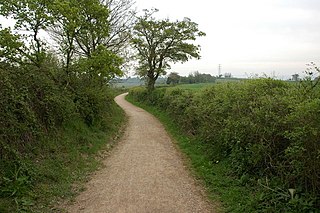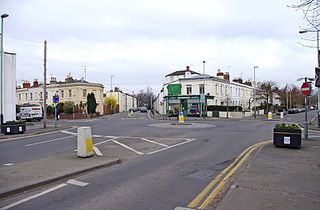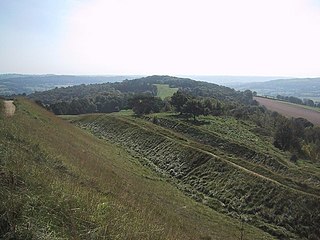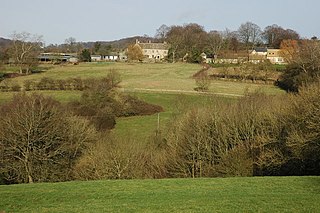
Beacon House is a grade I listed townhouse at New Street, Painswick, Gloucestershire, England.

Beacon House is a grade I listed townhouse at New Street, Painswick, Gloucestershire, England.
The Palladian house was built in 1766, possibly by John Wood the Younger. [1] [2]
The three-storey, three-bay limestone front of the building is topped with a cornice and a baluster parapet. [1] [3] The rococo plaster of the staircase was added by William Stocking. There is extensive plasterwork throughout the house. [1]

Painswick is a town and civil parish in Gloucestershire, England. Originally the town grew from the wool trade, but it is now best known for its parish church's yew trees and the local Rococo Garden. The village is mainly constructed of locally quarried Cotswold stone. Many of the buildings feature south-facing attic rooms once used as weavers' workshops.

The River Frome, once also known as the Stroudwater, is a small river in Gloucestershire, England. It is to be distinguished from another River Frome in Gloucestershire, the Bristol Frome, and the nearby River Frome, Herefordshire. The river is approximately 25 miles (40 km) long.

Sheepscombe is a small village in the English county of Gloucestershire. Sheepscombe is located some 6.5 miles (10 km) south-east of the city of Gloucester, 6 miles (10 km) north-east of the town of Stroud, and 1.5 miles (2 km) east of the village of Painswick. It lies in a narrow valley, hidden behind the Cotswold scarp, and just off the A46 and B4070 roads.

Uley Bury is the long, flat-topped hill just outside Uley, Gloucestershire, England. It is an impressive multi-vallate, scarp-edge Iron Age hill fort dating from around 300 B.C. Standing some 750 feet above sea level it has views over the Severn Vale.

Toddington is a village and civil parish in north Gloucestershire in Tewkesbury Borough, located approximately 12 miles (20 km) north-east of Cheltenham with a population of around 300, increasing to 419 at the 2011 census

The Wysis Way is an 88 km (55 mi) walking route which forms a link between the Offa's Dyke Path and Thames Path national trails in the United Kingdom. The Way runs between Monmouth in Wales and Kemble, Gloucestershire in England.

Ladybellegate House, 20 Longsmith Street, Gloucester GL1 2HT, is a Grade I listed building with English Heritage, reference number 1245726.

Syde, often in the past spelt Side, is a small village and civil parish in Gloucestershire, England. It lies in the Cotswolds, near the source of the River Frome, some six miles north west of Cirencester and seven miles east of Painswick.

The Red Lion is a Grade II listed public house at Ampney St Peter, Gloucestershire, GL7 5SL.

153-159 Fairview Road is a terrace of four houses in Cheltenham, Gloucestershire, on the south side of Fairview Road beside the roundabout at its junction with Hewlett Road. The terrace became a Grade II listed building in 1972. Street artist Banksy drew an artwork, The Spy Booth, on either side of a public telephone booth adjacent to the gable end of number 159 in April 2014. The work was destroyed in August 2016.

Kimsbury hill fort, also known as Castle Godwyn, Kimsbury Camp, Painswick Beacon or Painswick hill fort is an Iron Age hill fort on Painswick Beacon near Painswick in the Cotswolds, Gloucestershire England. The interior has been extensively quarried and parts are now a golf course, but much remains of the ramparts. Though there have been problems of erosion.

Nicholas Hyett (1709-1777) was a lawyer and justice of the peace in Gloucester, England, and one of the last keepers and constables of the Castle of Gloucester.

Painswick House is a grade I listed house in Painswick, Gloucestershire, England. It is surrounded by a Grade II* listed rococo garden.
The Court House is a grade I listed house in Hale Lane, Painswick, Gloucestershire, England, within the Cotswolds.

Painswick Lodge is a grade I listed house in Painswick, Gloucestershire, England. The rubble stone building, which has been extensively reworked and remodelled since the 16th century, was home to Lord of the Manor of Painswick between 1530 and 1804.

Bearland House is a grade II* listed building in Longsmith Street, Gloucester, England.

66 Westgate Street is a grade II* listed building in Gloucester, UK. It has been listed by Historic England under the Planning Act 1990.

The Fleece Hotel, Westgate Street, Gloucester is a timber framed building dating from the 15th century, which incorporated a 12th century stone undercroft. The building is part grade I and part grade II listed with Historic England.
Albert Estcourt was a builder in Gloucestershire, England, in the 19th century who with his brother, and later on his own, constructed a number of notable buildings in the county and across southern England.

Holcombe House is a large Grade II* listed country house located near Painswick, Gloucestershire. The house is a fine example of an Arts and Crafts Cotswolds manor house.
![]()
Coordinates: 51°47′10″N2°11′43″W / 51.78607°N 2.19520°W
| This article about a Gloucestershire building or structure is a stub. You can help Wikipedia by expanding it. |